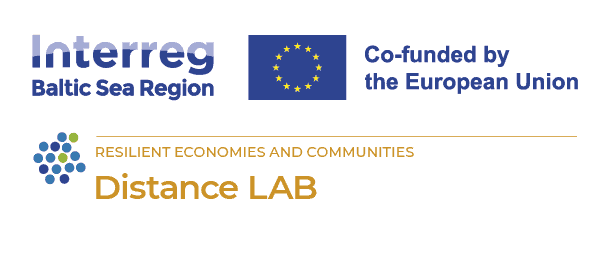
Insights into co-developing the DistanceLAB online hub for hybrid work
27 June 2025
In response to the ongoing evolution of the labour market, businesses across Europe are increasingly seeking innovative solutions to maintain productivity, collaboration, and team cohesion, regardless of whether colleagues are working from different cities or even countries. In this context, a consortium of innovation communities and universities from Scandinavia, the Baltic States, and Poland has introduced the “DistanceLAB hub”, a digital platform designed to support hybrid work models. An international team of partners from the Baltic Sea region, including experts from Tech-Park Kaunas, has developed the platform.
“Technology inclusion in shaping attractive remote work environments is one of the key trends across startup ecosystems,” says Irma Bagdonienė, Lithuanian representative of the Interreg Baltic Sea Region program’s project “Distance LAB” and project expert at Tech-Park Kaunas. “An appealing work environment today means more than community or human-centric values, it also reflects our relationship with the environment.”
The “DistanceLAB hub” features over ten tools grouped into three thematic categories:
- Innovate and Network – includes innovation tools, networking support, training modules, and self-assessment tests
- Strategize and Shape Your Business – offers solutions for business strategy development, customer relations, and market analysis
- Focus on Sustainability – guides aligning organisational activities with sustainable practices and environmental responsibility.
One of the platform’s highlights is the DIS (Distance Soft Interaction Skills) tool, designed to assess a team’s communication competencies in hybrid work environments. Additionally, the platform offers expert-led innovation workshop guides, AI and data analysis courses, and marketing automation solutions.
According to members of the startup community at Tech-Park Kaunas, including the team behind digital and interactive media development company “Indeform”, remote work continues to be an attractive model. “Working from home, or any location, has become not just a possibility, but a value for many professionals,” says Dr. Algirdas Noreika, CEO of “Indeform”. “The flexibility to set your schedule, choose your work environment, and eliminate commuting time are strong advantages of remote work.”
Dr. Noreika highlights one of the hybrid model’s key benefits: “It allows individuals to remain productive even while travelling. However, physical presence in a dedicated collaborative space often provides irreplaceable team-building benefits and fosters a shared sense of purpose. That’s why our choice is the hybrid model, which combines the best of both worlds. For most of the week, our team works from the office to tackle challenges and build synergy together, while retaining the option to work remotely when needed.”
While well-designed office spaces can enhance productivity, startup communities also recognise that even the best office environments are not always a major advantage. Paulius Nezabitauskas, Director of Tech-Park Kaunas, notes: “IT professionals value time for their hobbies and lifestyle. Hybrid work, when paired with effective tools and AI-driven solutions, helps create space for that. By offloading routine tasks and relying more on smart assistants, professionals gain more time for creative, high-value work, including innovation.”
As remote and hybrid work models continue to reshape the modern workplace, and the importance of soft skills is taking on a new dimension. While digital tools enable teams to work from anywhere, the human side of collaboration has become more critical than ever.
“Remote work brings many benefits, it opens the door to more flexible lifestyles and helps attract a smart, talented, and diverse workforce,” says Atle Jacobsen, Managing Director of “Vindel”, a startup community based in Norway. “But success in this environment goes beyond having the right technology.”
According to Jacobsen, the most effective remote professionals are those who intentionally develop soft skills such as clear communication, empathy, and the ability to build trust across virtual channels. These abilities help create alignment and a sense of authenticity, even when teams are spread across different time zones.
“Vindel’s” experience working with startups highlights that digital collaboration tools alone aren’t enough. For organisations to thrive in a hybrid world, they must also invest in developing the emotional intelligence and interpersonal awareness that strong leadership and teamwork demand. “Empowerment in remote settings comes not just from systems and software,” Jacobsen adds, “but from the people who know how to use them with emotional clarity and purpose.”
The “DistanceLAB” initiative brings together organisations from Lithuania, Finland, Sweden, Norway, Poland, and Latvia. This international scope allows for real-world testing and development of solutions tailored to diverse cultural and economic contexts.





